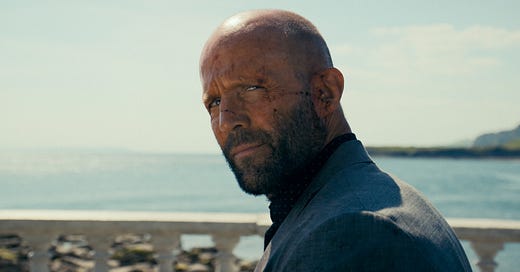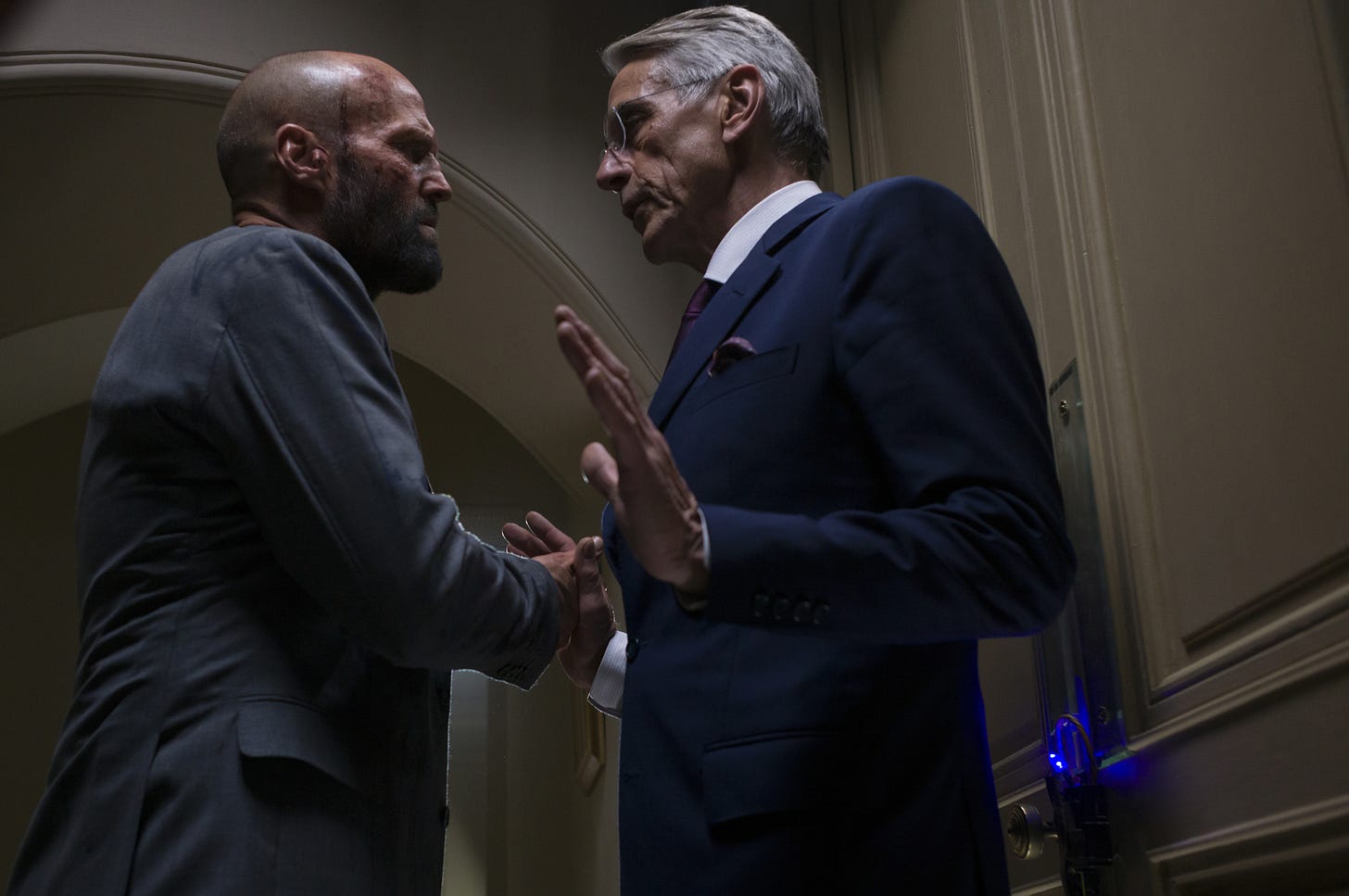THE BEEKEEPER UNDERSTANDS a, perhaps the, fundamental tenet of pulp cinema: There is something deeply satisfying about watching a good guy hurt bad guys in inventive ways.
You keep the story simple: Mr. Clay (Jason Statham) seeks revenge when his landlady/neighbor Eloise Parker (Phylicia Rashad) commits suicide after being scammed out of her life savings, retirement accounts, and charitable holdings as part of an organized phishing attack. Neither the police nor the FBI can bring those who wronged her to justice. Mr. Clay, however, is a “Beekeeper”: Imagine the CIA by way of Delta Force but a million times more badass and you’ll you get the idea.
There’s a generational conflict here: Mickey Garnett (David Witts), who runs the outfit that robbed Eloise, comes off like a Gen Z Wolf of Wall Street. As he walks his minions (and the audience) through the steps of the scam, he exudes youthful arrogance that tips over into sociopathy. While begging for his life, he offers a bribe of NFTs to Mr. Clay, a guy fluent in nothing more complex than bulky MS-DOS-prompt desktops and dot-matrix printers. When Mickey’s boss, the 28-year-old Derek Danforth (Josh Hutcherson), is seen hitting on a woman at a political fundraiser, he asks if she’s into crypto. These man-children stand little chance against Gen X god Jason Statham; their perpetual petulance only annoys the silver-tongued Boomer Jeremy Irons. We have met the enemy, and it is youth.
Naturally, the Beekeepers have to work outside the system to protect “the hive.” The system has limits, you know. Rules and regulations. “If you’re done shitting all over this gentleman’s civil rights,” Agent Matt Wiley (Bobby Naderi) says to Agent Verona Parker (Emmy Raver-Lampman), pulling her off one of the phishermen left in the wake of Mr. Clay’s initial rampage. Another fundamental of pulpy revenge movies: The system has to fail, inspiring those with a death wish to clean up the streets. Even those who work within the system, like Dirty Harry Callahan (Clint Eastwood), do so begrudgingly, stymied at every turn by criminal-coddling bureaucrats.
Between this and Silent Night, it feels like Hollywood is reacting to public unease with violent crime (even if rates have finally started to come down after recent spikes).
I’m a relatively easy sell when it comes to this sort of movie, but The Beekeeper is a nearly perfect pulp picture on almost every axis.
It’s stylish without being heavily stylized: Director David Ayer worked the smoke machines hard on this one, giving nearly every interior’s lighting an almost tangible quality, literally thickening the air. Combined with spotlights shooting luminous spears through the smoky fog, and every set feels a little dangerous.
It’s silly—you could not possibly predict who Mr. Clay’s eventual target ends up being—without being stupid. One of the joys of the film is the way in which various people in positions of power—former CIA head Wallace Westwyld (Jeremy Irons), current CIA head Janet Harward (Minnie Driver)—ominously intone “Beekeeper” over and over. “A Beekeeper Beekeeper?” Beekeepers protect the hive, you see—the hive being society, society existing in a delicate balance, the balance kept by those eliminating troublemakers—from “hornets.” It feels as though writer Kurt Wimmer tackled this script with two goals: work as many bee puns into it as he could and devise fiendishly inventive ways to do bodily harm to Gen Z blackguards.
And it’s cast as well as a movie of this sort can be. Jason Statham remains the great heir to the Stallone or Van Damme era of action star: he’s smooth yet solid, compact and muscled, completely believable as a one-man wrecking crew dismantling teams of killers. The fights here aren’t inventive or fluid in the mold of John Wick, but the kills are delightfully brutal and often unexpected. That said, it’s the supporting roles that really shine. Given that Jeremy Irons has been proven by science to have a perfect voice, producers for every single pulp movie should have him deliver expository dialogue. Witts and Hutcherson are perfect as simpering, whimpering youths. And every movie of this sort should call in a guy like Taylor James, who plays an Afrikaans-accented mercenary called in to take down Mr. Clay. There’s just something diabolical about his clipped South African pronunciation.
I saw The Beekeeper with a paying audience this weekend at a preview, and they were positively buzzing afterward. It’s a pleasing throwback, old ideas and ideals convincingly packaged in a modern wrapper.






